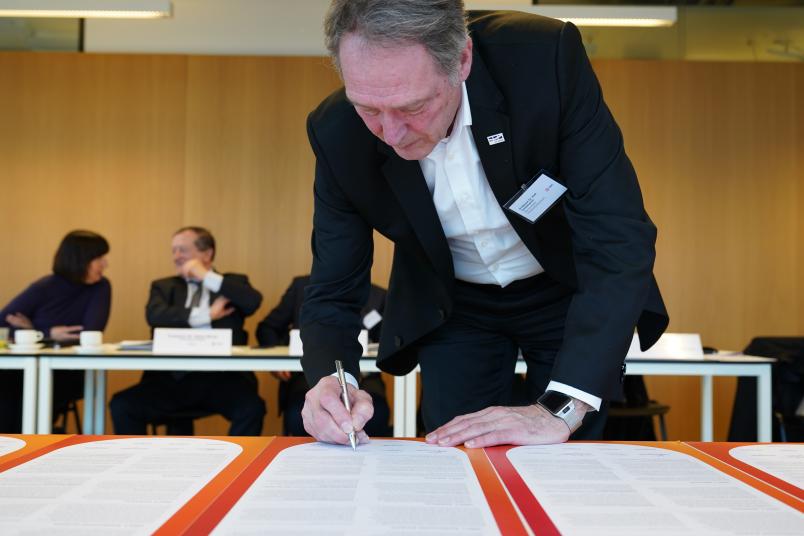
Mission Statement UNIC
Becoming a European university
Eight universities from post-industrial cities in Europe are joining forces. The alliance aims to help shape inclusive European societies of the future.
A European alliance of eight universities based in post-industrial cities is competing in the EU’s European Universities competition with a clearly defined mission: to help shape the development of European societies through innovative forms of mobility and exchange. The universities’ presidents and rectors signed their joint mission statement in Rotterdam on 5 February 2020. Ruhr-Universität Bochum (RUB) is cooperating in this network with the universities of Bilbao, Cork, Istanbul, Liège, Oulu, Rotterdam and Zagreb. The consortium is led by Erasmus University Rotterdam in the Netherlands.
The objective of the UNIC – Universities in post-industrial cities – alliance is to meet the challenges of tomorrow’s inclusive European societies. To this end, new forms of mobility and socially relevant joint projects with and in cities are to be promoted. The partners have what it takes, namely extensive experience with the transformation into the future at their locations, all of which are characterised by superdiversity.
Student participation
At all eight universities, student representatives were deeply involved in the conception of the joint project. Rector Professor Axel Schölmerich has signed the mission statement on behalf of the RUB. “Our objective is to open up the full potential of Europe to students, and to do this with outstanding partner institutions,” says the Rector. “Our experience in cooperating with post-industrial cities with their superdiversity puts us at the forefront of a development that will shape our future to a considerable extent. Accordingly, the collaborating universities are tasked with developing new approaches and models in research, teaching and transfer that meet these social challenges. At the same time, this approach will render the European idea more persuasive and will strengthen the ability of our institutions to build a competitive inclusive society. This is how our students are contributing to the future of Europe.”
Post-industrial cities across Europe face many similar social challenges due to the transition from a production-based to a service-based economy. These include employability and unemployment, particularly among young people, the impact of new technologies, the transition to renewable energy sources and developments in the healthcare sector.
Superdiversity is a defining feature
A defining feature of a post-industrial European city is its socio-economic and socio-cultural superdiversity. It requires new, widely accessible and inclusive forms of research, teaching and learning that take into account and respond to the requirements of different population groups. The UNIC alliance will be developing models that will help European universities to actively shape the changing societies in Europe.
Campus, Academy and City Labs
The long-term alliance of universities is supported by three pillars:
- Inter-university campus: enables students, employees and researchers to seamlessly transition into study, teaching, research or to share services within the alliance, regardless of their socio-economic and cultural background.
- Superdiversity Academy: develops teams, organisations and new approaches to work in superdiverse teaching and learning settings based on existing research findings.
- City Labs: creates meeting points for the exchange of knowledge in and with the 8 cities.
The UNIC alliance application will be submitted to the European Commission for evaluation in the course of February. A decision on the funding is expected in summer 2020.